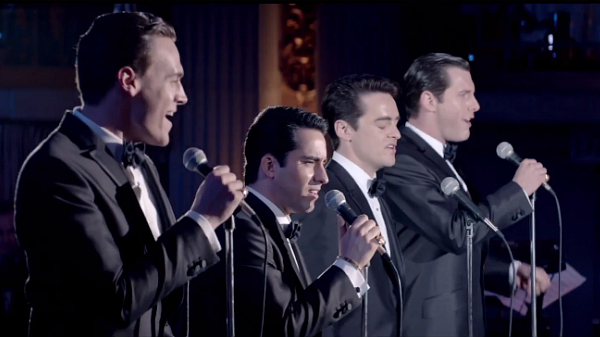‘Jersey Boys’ hits the high notes while falling flat

“Jersey Boys” the Broadway musical, who loves you, pretty baby? I do. When “Jersey Boys” came to the Fox Theatre in 2009 it was so much fun it was hard to resist dancing in the aisles. The songs were stuck in my head for a week. The story of Frankie Valli and the Four Seasons’ rise to superstardom and an eventual breakup was a celebration of their captivating 1960s hits like “Sherry,” “Big Girls Don’t Cry” and “Rag Doll.” The 1960s were a time of Motown, pop rock and catchy vocal harmonies – the age of irresistible “oohs.”
For millennials like myself, these songs even became part of our musical lexicon, with “Walk Like a Man” aptly sneaking into “Mrs. Doubtfire” (1993) and Heath Ledger wooing Julia Stiles via bleacher ballad “Can’t Take My Eyes Off You” in “10 Things I Hate About You” (1999). The Four Seasons’ melodies are so infectious that their songs span decades. It would be hard to mess up a story told through music this lively, right?
Wrong. Adapted from the musical to the screen by director Clint Eastwood, the “Jersey Boys” film placed the darker narrative of the Four Seasons before the nasal-voiced pop rock joy that is the music, losing a lot of the charm of the Tony-winning Broadway play. Filmed more like a biopic than a movie musical, the songs are trotted in for their radio and stage debuts then are often faded out into the next scene. Some of them solely get background play behind dialogue. Which is a shame, because the cast is composed of amazing Broadway singers who do justice to the hits – and that’s no easy feat with a voice like Frankie Valli’s.
Talented as they may be at singing, the actors get the movie off to a dull start. We’re introduced to the three original members of the will-be Four Seasons: Tommy DeVito (Vincent Piazza), Nick Massi (Michael Lomenda) and Frankie Valli (John Lloyd Young – who starred as Valli in the original Broadway production). Though they hit the high notes on stage, their acting falls flat, dragging the story along until they meet songwriter Bob Gaudio (Erich Bergen), who completes the foursome and finally brings life to the screen. After that, the narrative stays somber, focusing on how DeVito’s financial troubles put a strain on the band, leading to the inevitable breakup and Valli’s solo career.
It’s always interesting in adaptations to see which original elements are kept or cut. Eastwood chose to keep the direct address used in the play: the actors speak into the camera, letting the popcorn-crunching audience in on the backstory and the character’s viewpoints. What works on stage to make an inclusive experience translates awkwardly to screen, with different band members suddenly taking on narration halfway through the movie. We hear from everyone but Valli, an odd choice because the cinematography kept leading us to potential moments for his narration: the camera would slowly zoom towards Valli, he’d look directly into it, then it would clip off to the next scene. At the end, Valli finally speaks to the camera, as each of the band members does an odd piece of direct address epilogue that works on stage, but is overwrought on film.
The last few scenes hint at what the “Jersey Boys” movie could have been: “Can’t Take My Eyes Off You” gets the lead-up, the showmanship and the emotional payoff such a mega-hit deserves. It was the only scene that gave me chills in a movie that should’ve been filled with sweeping moments. And for the credits, Eastwood perhaps does himself a disservice by offering up a theatrical tableau: the entire cast does a medley of the songs as if in a traditional musical, dancing down a set of a busy New York City street with swishing skirts, retro dance moves and elated breaths as the actors hold their final pose.
In the closing credits we see all the life, fun and color that is “Jersey Boys” on stage in direct comparison to the lifeless drab of the movie. You’re not even going to want to watch this on Netflix, just grab a ticket next time the Broadway show rolls into town.

























